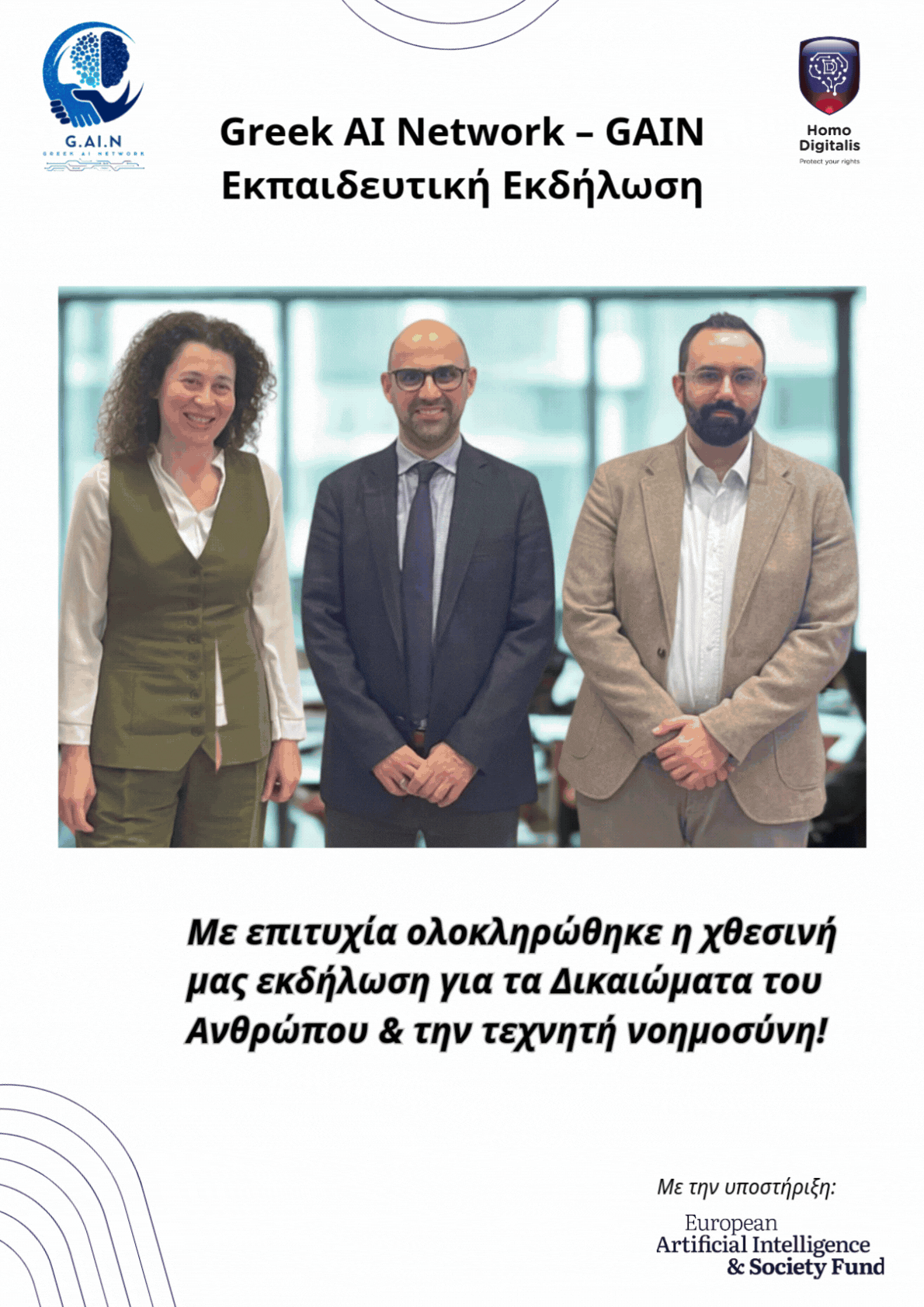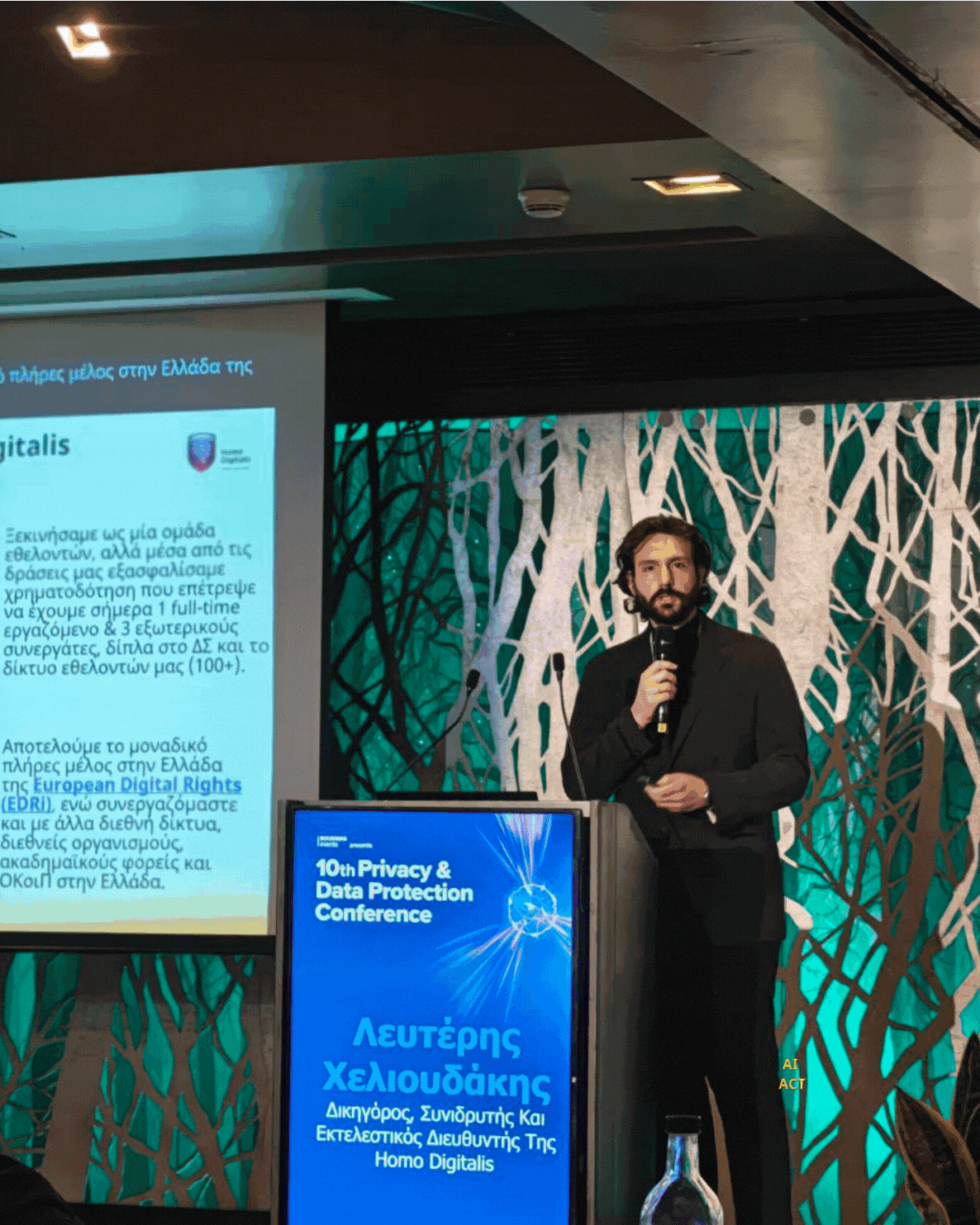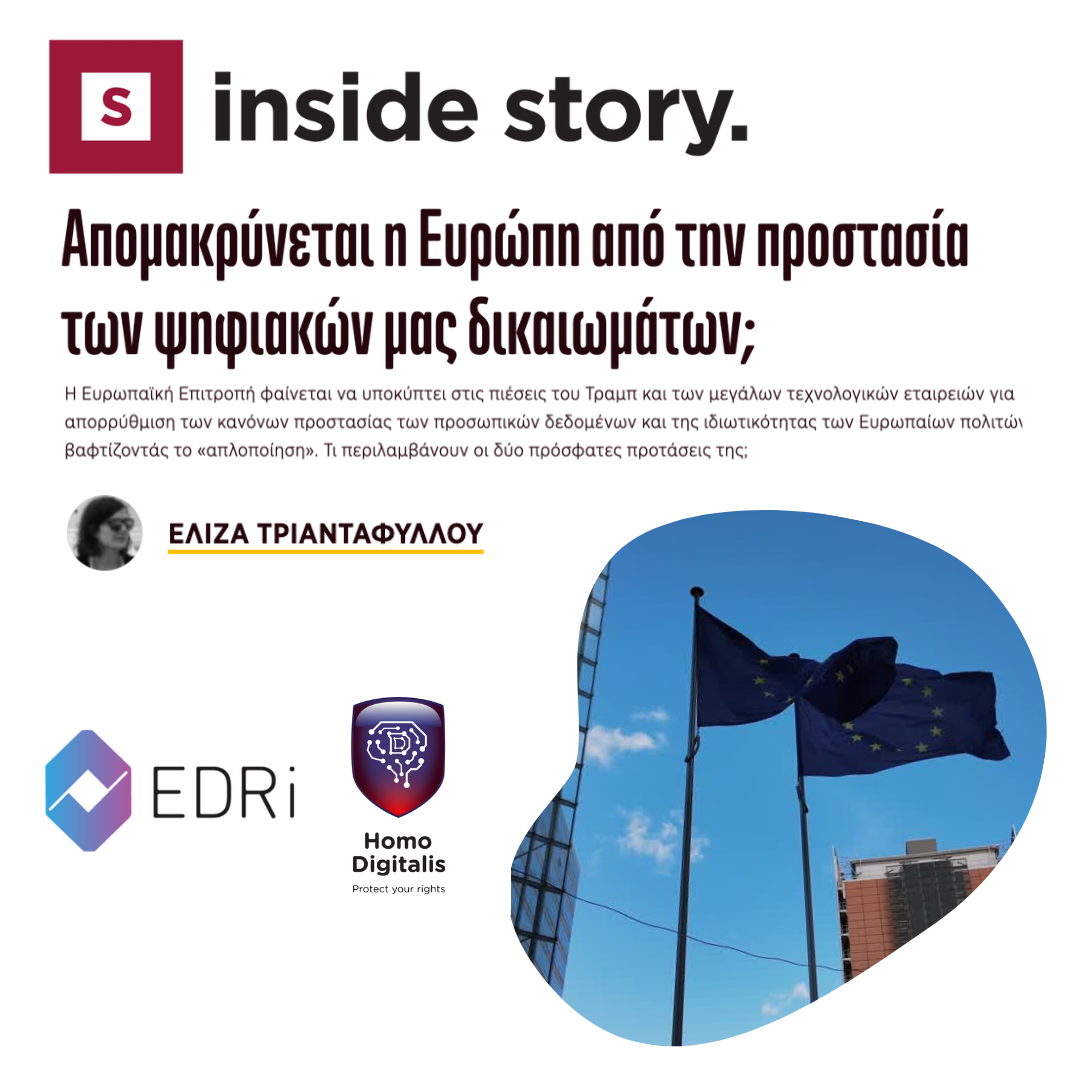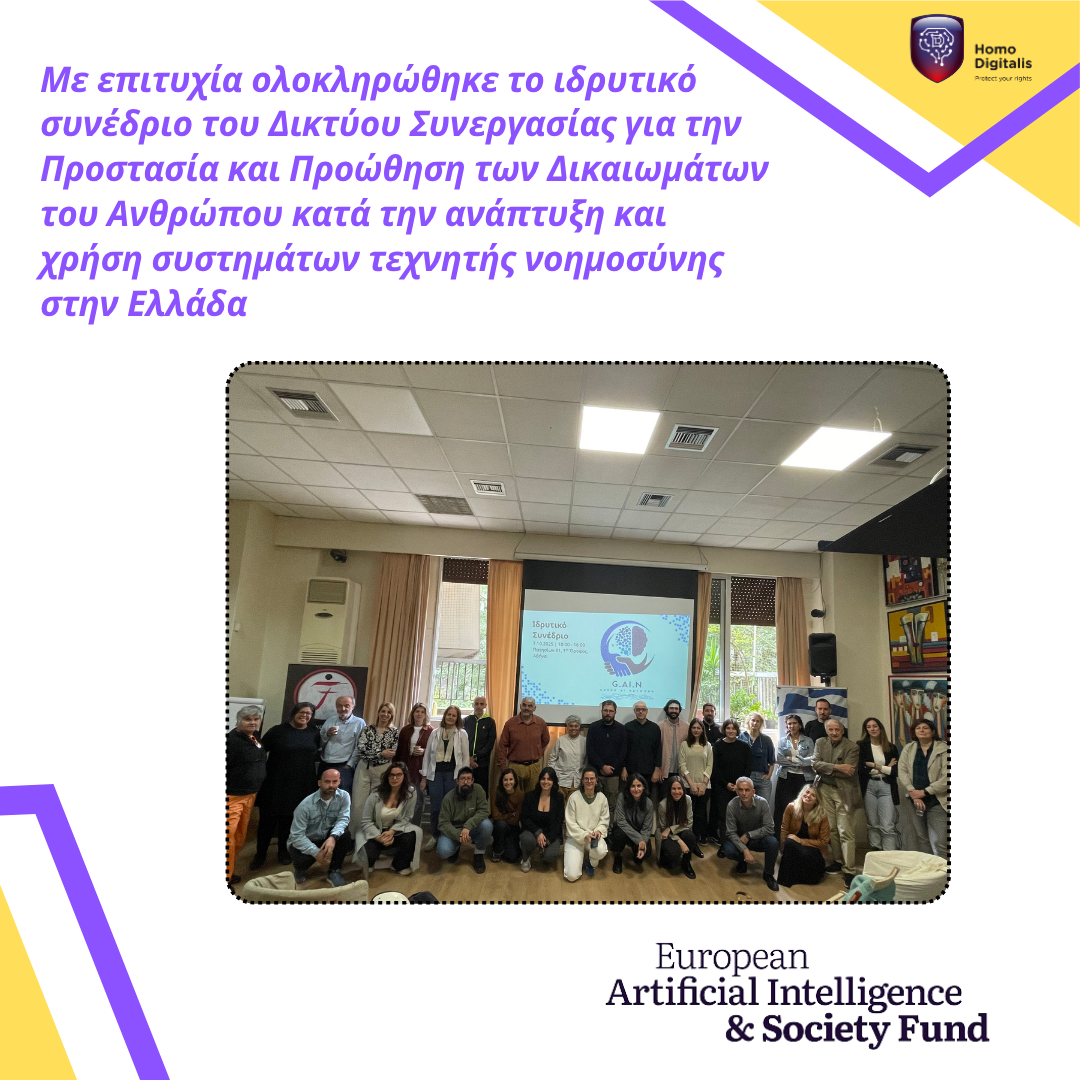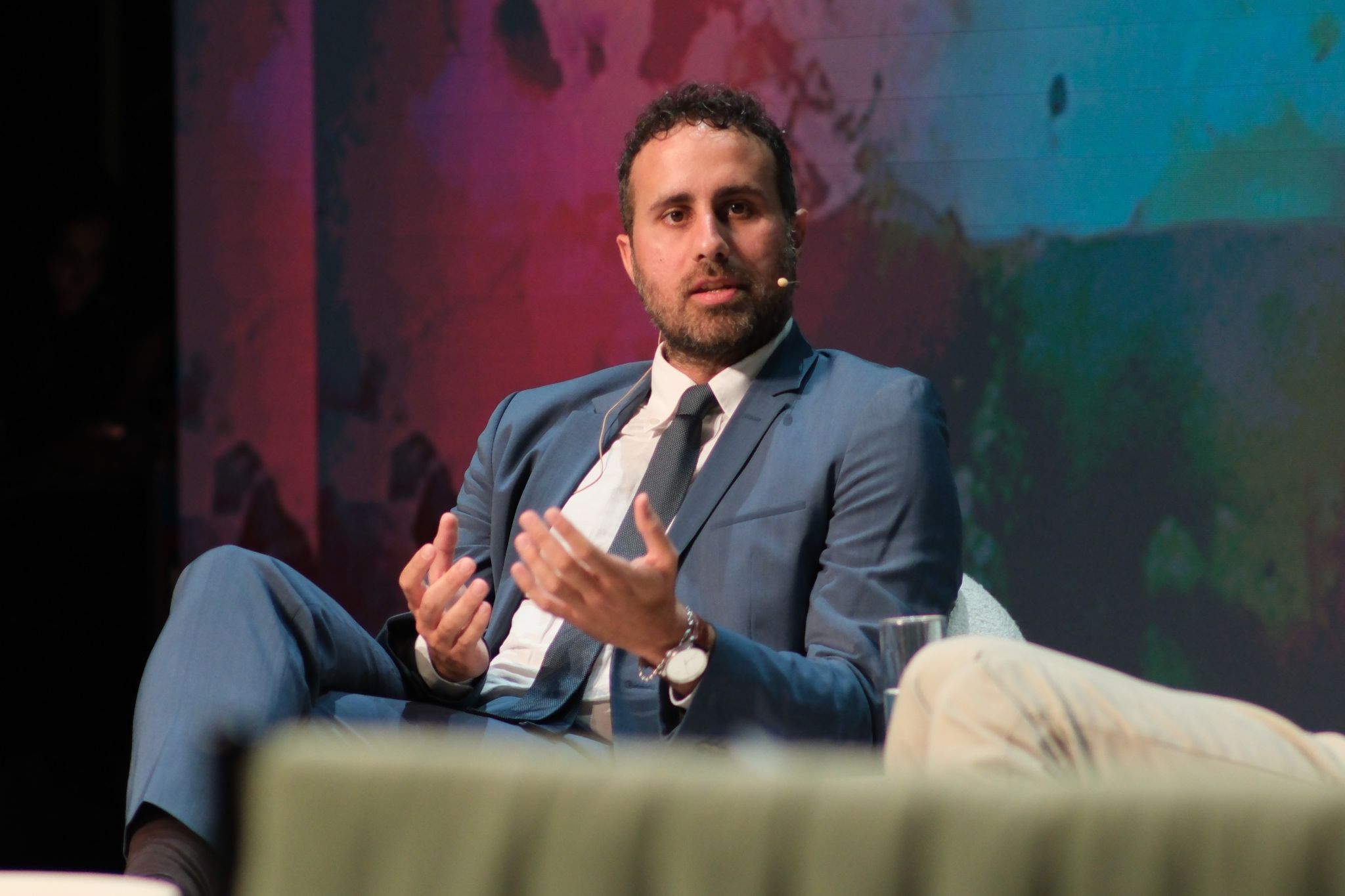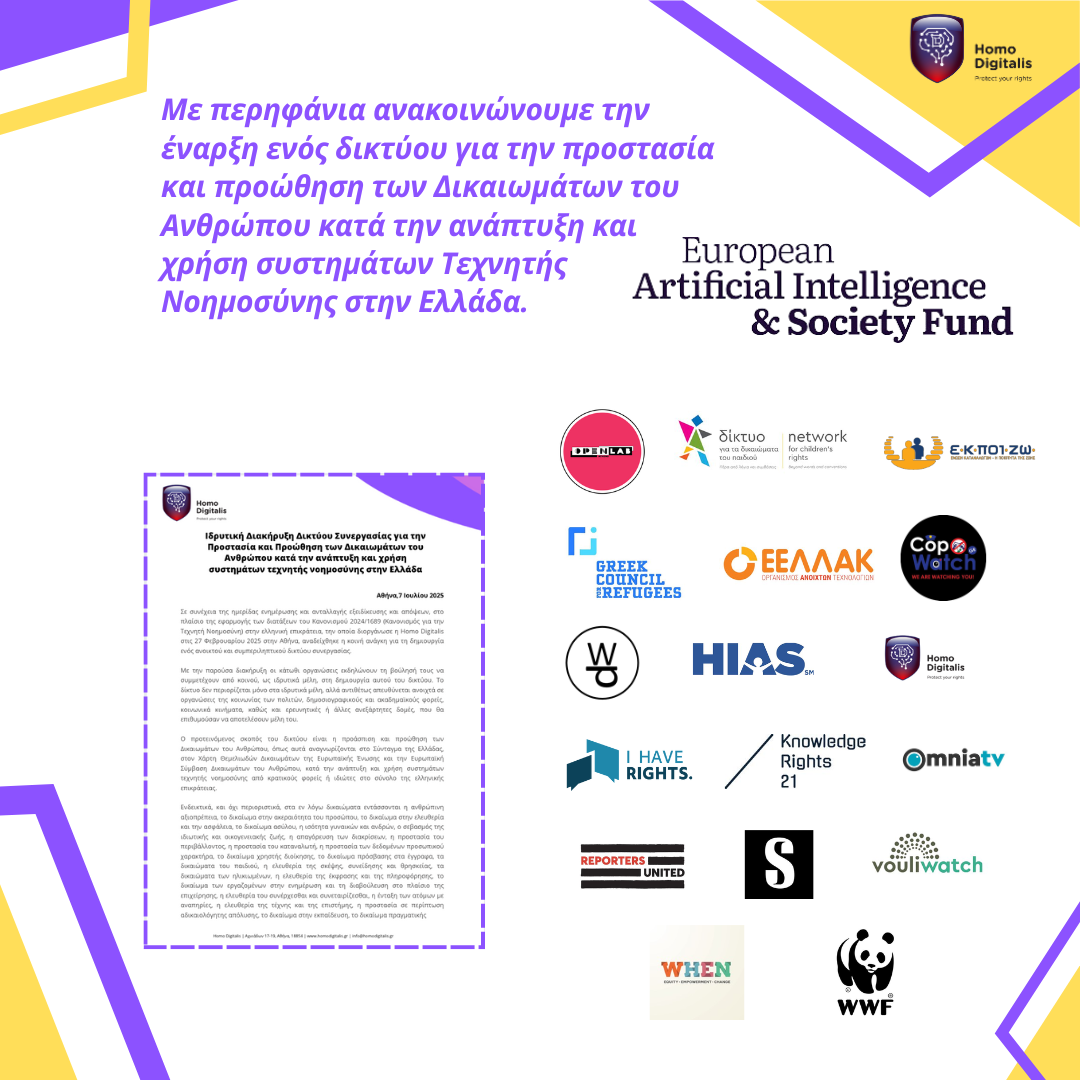Our GAIN event with the supervisory authorities of Article 77 of the AI Act was successfully concluded
Yesterday’s event, which we co-organized with the civil society network Greek AI Network – GAIN at the offices of network member WHEN Hub, was successfully completed.
The event opened with a welcoming address by our Co-founder and Treasurer of the Board, Konstantinos Kakavoulis. This was followed by educational presentations from representatives of two fundamental rights authorities under Article 77 of the AI Act, namely Dr. Efrosyni Siougle from the Hellenic Data Protection Authority and Dr. Christos Tsevas from the Greek National Commission for Human Rights.
Finally, during the Members in the Spotlight Session, our member and DPO Executive / GDPR Expert, Dimos Kostoulas, delivered an educational presentation on the processing of personal data in the healthcare sector and the use of Artificial Intelligence systems in this field.
We warmly thank the speakers, the members of the GAIN network, and the members of Homo Digitalis who joined us both online and in person, as well as the other organizations that honored us with their presence.
The event was held within the framework of the GAIN program, with the support of the European AI & Society Fund.
We presented our Study on the Digital Omnibus package at the Privacy & Data Protection Conference
Last Friday, Homo Digitalis was invited to the Privacy & Data Protection Conference, organized by BOUSSIAS.
There, our Executive Director, Eleftherios Chelioudakis, presented our Study on the Digital Omnibus reform packages, highlighting the challenges that the proposed changes pose to our rights in the contemporary digital era.
You can read our Study here.
We would like to warmly thank the conference organizers, and especially Alexandra Varla, for the very honorable invitation. Congratulations as well to all the speakers for their insightful contributions.
.
Homo Digitalis & EDRi speak to inside story on the proposed Digital Omnibus regulations
Ιs Europe moving away from the protection of our digital rights?
inside story. and journalist Eliza Triantafyllou published an in-depth article on Monday, December 1, examining the European Commission’s Digital Omnibus proposals. European Digital Rights (EDRi) and Homo Digitalis had the honor of contributing comments and arguments, represented by their members Blue Duangdjai Tiyavorabun, Ella Jakubowska (she/her), Itxaso Domínguez de Olazábal, PhD, and Eleftherios Chelioudakis.
Is the EU giving in to pressure from Trump and major technology companies to deregulate rules protecting Europeans’ personal data and privacy, rebranding it as “simplification”? What exactly do the two recent proposals include? Read the article here.
We warmly thank the journalist for her interest in our arguments.
The Founding Conference of the Greek Artificial Intelligence Network – GAIN Successfully Concluded
The founding conference of the Cooperation Network for the Protection and Promotion of Human Rights in the Development and Use of Artificial Intelligence Systems in Greece was successfully completed! The provisional title of the network is Greek Artificial Intelligence Network – GAIN.
The network aspires to become a space for collaboration, knowledge exchange, and mutual support, fostering initiatives in awareness-raising, advocacy, and legal assistance — with the central goal of safeguarding Human Rights in the development and use of Artificial Intelligence systems.
The network’s activities aim to go beyond the minimum legal guarantees, drawing guidance from codes of ethics that emphasize morality, transparency, and accountability in the design, implementation, and evaluation of AI technologies.
The event took place on October 7, 2025, hosted at the offices of the Greek Forum of Migrants, where members and observers of the network had the opportunity to discuss, plan, and lay the foundations for an open, collaborative, and socially responsible AI community in Greece.
During the event, Open Lab Athens delivered an educational presentation on the technical characteristics and materialities of machine learning, significantly contributing to the discussion and collective understanding of the related technologies and their limitations.
The initiative is coordinated by the Homo Digitalis team, with the support of the European Artificial Intelligence & Society Fund (EAISF).
You can read the related Press Release (ΕL) here.
Organizations participating in the network’s processes as members or external observers include (in alphabetical order):
Ανοιχτό Εργαστήριο Αθήνα | Open Lab Athens
Διεπιστημονική Εταιρία Έρευνας στην Αιματολογία – ΔΕτΕΑ
Δίκτυο για τα Δικαιώματα του Παιδιού | Network for Children’s Rights
Ε.Κ.ΠΟΙ.ΖΩ.Ένωση Καταναλωτών «Η Ποιότητα της Ζωής» | Consumers’ Association “The Quality of Life” EKPIZO
Ελληνική Ένωση Δικαιωμάτων του Ανθρώπου | Hellenic League for Human Rights
ΕΛΛΗΝΙΚΟ ΣΥΜΒΟΥΛΙΟ ΓΙΑ ΤΟΥΣ ΠΡΟΣΦΥΓΕΣ | GREEK COUNCIL FOR REFUGEES
Ελληνικό Φόρουμ Μεταναστών | Greek Forum of Migrants
Εταιρεία Περιφερειακής Ανάπτυξης και Ψυχικής Υγείας – ΕΠΑΨΥ | Association for Regional Development and Mental Health – EPAPSY
Ένωση Πληροφορικών Ελλάδος
Ινστιτούτο Έρευνας Ρυθμιστικών Πολιτικών – ΙΝΕΡΠ | Institute for Regulatory Policy Research – INERP
Κέντρο ΔΙΟΤΙΜΑ
ΚΥΤΤΑΡΟ ΕΝΑΛΛΑΚΤΙΚΩΝ ΑΝΑΖΗΤΗΣΕΩΝ ΝΕΩΝ – ΚΕΑΝ | CELL OF ALTERNATIVE YOUTH ACTIVITIES
Με Άλλα Μάτια | Me Alla Matia
Οργανισμός Ανοιχτών Τεχνολογιών – ΕΕΛΛΑΚ | Open Technologies Alliance (GFOSS)
ΠΑΡΑΤΗΡΗΤΗΡΙΟ ΑΣΤΥΝΟΜΕΥΣΗΣ copwatch.gr
AMKE REVMA – ROMA EDUCATIONAL VOCATIONAL MAINTAINABLE ASSISTANCE
Athens Network of Collaborating Experts -ANCE
DATAWO
ERGO.Academy
HIAS Greece
Homo Digitalis
I Have Rights
In contACT
inside story.
KnowledgeRights21 (National coordinator for Greece and Cyprus)
OmniaTV (iCase Κοιν.Σ.Επ.)
Reporters United
SolidarityNow
Solomon
VISIBLE MACHINES
Vouliwatch
WHEN Equity Empowerment Change
WWF Greece
Homo Digitalis spoke on smart farming and the AI Act
In the beginning of july, the AgriDataValue project hosted an in-depth online workshop dedicated to data privacy, legal, and ethical dimensions within the context of smart farming. Organized by Netcompany, the event brought together AgriDataValue partners, Advisory Board members, legal experts, as well as representatives from related EU-funded projects.
Homo Digitalis participated in the workshop, giving a legal presentation on the topic “Smart Agriculture from a GDPR and AI Act Perspective”. Many thanks to Ioannis Chrysakis for the kind invitation! Our Executive Director, Eleftherios Chelioudakis, represented us.
The objective of the workshop was to identify and validate key ethical, legal, social, and privacy-related topics linked to the AgriDataValue platform. It also served as an opportunity to review data flow mappings between the project’s technologies, user types, and integrated services, a vital exercise for ensuring compliance, transparency, and responsible data governance.
Homo Digitalis contributes to two EU consultations on the Data Strategy and high-risk AI systems
Last Friday, July 18th, Homo Digitalis submitted detailed input to two public consultations launched by the European Commission.
The first consultation focused on collecting targeted input from stakeholders regarding the implementation of the AI Act (2024/1689) rules for high-risk AI systems. According to Article 6(5) of the AI Act, the Commission must publish guidelines on the practical implementation of the high-risk classification rules by February 2, 2026, accompanied by a list of practical examples of both high-risk and non-high-risk AI systems. Additionally, Article 96(1)(a) requires the Commission to provide guidelines on the application of obligations and responsibilities for high-risk AI systems, including those across the AI value chain, as defined in Article 25. In its submission, Homo Digitalis provided practical examples of AI systems from Greece and other countries, and highlighted key issues that should be clarified in both the classification and compliance guidelines.
The second consultation addressed the EU Data Strategy. Its three goals are to: 1) boost investment in data technologies and promote data sharing through voluntary or funded initiatives; 2) streamline existing rules and develop data tools to reduce administrative burdens; and 3) shape an international data strategy that ensures safeguards for data transfers outside the EU and encourages data inflows into the EU.
In its response, Homo Digitalis raised strong concerns about potential undermining of personal data protection under the pretext of simplification, flexibility, and competitiveness. The organisation reaffirmed its position that fundamental rights must be strengthened through the use of new technologies and rejected the framing of existing legal frameworks as a barrier to innovation. According to Homo Digitalis, the challenges lie primarily in the lack of enforcement and resources, not the laws themselves.
You can read our full submission for the first consultation here.
We thank the drafting team, Stavrina Chousou, Niki Georgakopoulou, Sofia Antonopoulou, and Eleftherios Chelioudakis, for their valuable contributions.
You can read our full submission for the second consultation here, edited by our Executive Director, Eleftherios Chelioudakis.
Homo Digitalis Participates in the 1st Consultation Forum of the Ministry of Digital Governance on the AI Act
On July 2, 2025, Homo Digitalis participated in the 1st Consultation Forum titled: “The Implementation of the AI Act in Greece”, organized by the Ministry of Digital Governance and Expertise France.
The event was held in the context of the TSI Technical Support action “Integrating AI Technologies in the Greek Public Administration”, funded by the European Commission (SG REFORM). Its aim was for the Ministry to gather valuable information, exchange views with stakeholders, explore best practices, challenges, and prospects, and present its proposal for the implementation of the AI Act and AI governance in the country.
Homo Digitalis was invited to participate in the roundtable discussion of the thematic session “Artificial Intelligence in the Public Sector”, which focused on the challenges and opportunities of implementing AI systems by public sector entities in Greece.
During the event, we submitted our written views on the questions raised in the thematic session to the Ministry, distributed copies of our statements to relevant decision-making bodies, and presented them orally as part of our contribution during the roundtable discussion.
We sincerely thank the organizers and speakers of the event for including us and giving us the opportunity to share our positions! Homo Digitalis was represented by Eleftherios Chelioudakis, Co-founder and Executive Director of Homo Digitalis, who also is the editor our statements.
You can view our written positions here (in EL).
Homo Digitalis spoke at the 2nd International Conference of ATI dedicated to Democracy and Social Justice.
Homo Digitalis participated in the 2nd International Conference of the Alexis Tsipras Institute
Konstantinos Kakavoulis joined academics, professionals, politicians, and activists from Greece, the European Union, and the United States. He spoke about the need to strengthen the protection of digital rights in modern democracies, on a panel that attracted great interest. Among the distinguished speakers at the event were Bernie Sanders, Michael Sandel, Jeffrey Kopstein, and many others. The speech is available at the link here.
We warmly thank the organizers for the invitation and for the excellent discussions we had during the event!
Joint Declaration for the Creation of a Human Rights Protection Network in the Development & Use of AI Systems – GAIN
We are proud to announce the official launch of a collaborative and inclusive network, committed to the protection and promotion of Human Rights, Democracy, and the Rule of Law in the development and use of Artificial Intelligence systems in Greece.
The network was born out of a multi-stakeholder dialogue initiated during the February 2025 event organized by Homo Digitalis, in light of the implementation of the European Artificial Intelligence Regulation (Regulation 2024/1689).
The text of the Declaration is available here.
The mission of the network is to serve as a space for collaboration, advocacy, legal interventions, and public awareness, ensuring that AI systems in Greece comply with fundamental rights and democratic values, as enshrined in the Greek Constitution, the EU Charter of Fundamental Rights, and the European Convention on Human Rights.
The working title of the network is Greek Artificial Intelligence Network – GAIN. The founding conference, which will take place within three (3) months, will determine the network’s governance framework, guiding principles, and future direction.
The initiative is coordinated by Homo Digitalis, with the support of the European Artificial Intelligence & Society Fund (EAISF), and is open to any interested organization.
If you are interested, you can fill in the participation form here.
Founding organizations of the network (in alphabetical order):
Ανοιχτό Εργαστήριο Αθήνα | Open Lab Athens
Δίκτυο για τα Δικαιώματα του Παιδιού | Network for Children’s Rights
Ε.Κ.ΠΟΙ.ΖΩ.Ένωση Καταναλωτών «Η Ποιότητα της Ζωής» | Consumers’ Association “The Quality of Life” EKPIZO
ΕΛΛΗΝΙΚΟ ΣΥΜΒΟΥΛΙΟ ΓΙΑ ΤΟΥΣ ΠΡΟΣΦΥΓΕΣ | GREEK COUNCIL FOR REFUGEES
Οργανισμός Ανοιχτών Τεχνολογιών – ΕΕΛΛΑΚ | Open Technologies Alliance (GFOSS)
ΠΑΡΑΤΗΡΗΤΗΡΙΟ ΑΣΤΥΝΟΜΕΥΣΗΣ copwatch.gr
DATAWO
HIAS Greece
Homo Digitalis
I Have Rights
KnowledgeRights21 (National coordinator for Greece and Cyprus)
OmniaTV (iCase Κοιν.Σ.Επ.)
Reporters United
Solomon
Vouliwatch
WHEN Equity Empowerment Change
WWF Greece
